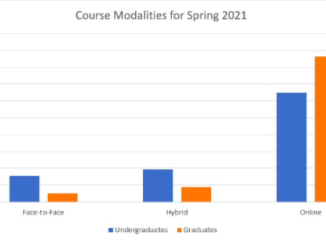
By Guillermo Pizano-Nunez
As the vaping craze takes over college campuses everywhere, the issue of bootleg THC cartridges has become a threat that universities do not know how to deal with. According to the Center for Disease Control, 1,888 cases of vaping-related lung injuries have occurred with 37 confirmed deaths in the United States. Vaping products containing THC, mostly obtained through the black market, are linked to most cases. “Vaping is a great threat to the community at large,” says Mary Catherine Rauh, a nurse at the Wellness Center.
“The long-term effects are there. Increased heart rate and lung damage are just among some of the things that could happen,” says Rauh. Aside from these long-term effects, recent information from the CDC points to vitamin E acetate among many other additives connected to the national outbreak.
“The chemicals in vaping pens are not regulated” says Elizabeth Ritzman, director of the Wellness Center. “The blends of whatever they put in there are worse.”
Vitamin E acetate is naturally derived supplement that is found in skincare product. The oil is used as a thickener for these bootleg products. The oil is not intended for inhalation.
Many campuses around the nation are ill-equipped and ill-prepared to handle the damaging cases of young adults vaping THC. The Wellness Center is advising that people avoid THC vapes at all costs.
“There’s not a lot guidance from government agencies. They only advise people not do it.” says Jeanne Carlson, a nurse practitioner at the Wellness Center.
Agencies and institutions advise against the use of such products with some students listening.
One student says she used to vape THC products, but not anymore.
“Because of the fear of the chemicals, I wasn’t sure of what I was smoking anymore. The packaging can also look funny too when there’s cartoons on it. I won’t trust it.”
Another student says she doesn’t care much for the warnings.
“I don’t really care about the health effects just because I know I’m not smoking it all the time. It’s more of a phase for me. I can also tell you that those people with health problems were probably getting high all the time.”
As THC vaping becomes popular, colleges are doing very little to help prevention. Though, earlier efforts for overall smoking has helped on Dominican’s campuses. In early 2016, Dominican University banned tobacco and smoking across all properties. The ban, despite agitating some students, was a positive move for stopping students from smoking.
“Before the no-smoking policy, people would smoke everywhere. You couldn’t go anywhere without seeing someone smoking” says Rauh.
Despite campus regulations, new vaping technologies do allow for discreet usage so 2020’s marijuana legalization could lead to a rise with on-campus vaping.



